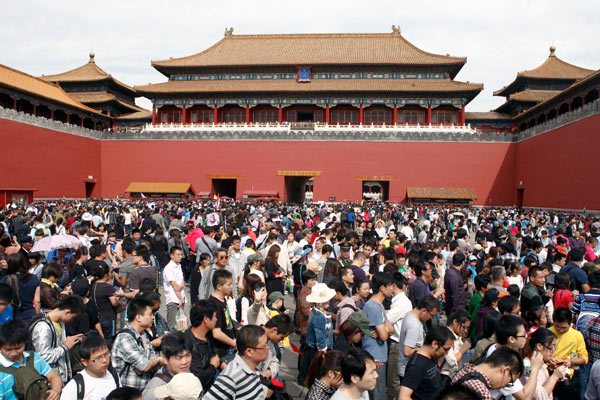Tourist sites overwhelmed as toll-free roads increase crowds
The extended national holidays and a decision to waive highway tolls have brought many tourist attractions to a virtual standstill since the beginning of the eight-day vacation.
Authorities have felt the pinch of the projected 13 percent increase in travelers on the roads, in part boosted by toll-free highways during major festivals, effective since Sunday.
According to figures from 119 tourist sites tracked by the National Holiday Office, 5.76 million visitors were out and about by Tuesday, up 29 percent year-on-year.
Holiday income at tourist attractions reached 310 million yuan ($49.3 million), skyrocketing by 33 percent year-on-year.
 |
Visitors wait to enter the Palace Museum, or Forbidden City, in Beijing on Wednesday. [Photo / China News Service]
|
But the huge crowds, heavy traffic and exorbitant prices in tourist areas have taken some of the luster out of Golden Week.
The huge volume of visitors overwhelmed the capacity of the cable cars at Huashan Mountain, in Shaanxi province, leaving tens of thousands stuck at the peak late into Tuesday night.
According to China Central Television, restless visitors demanded refunds from the tourism committee, and police were dispatched to help deal with the crisis.
Chen Li, deputy director of the Shaanxi Provincial Public Security Department, said on his micro blog that more than 300 policemen and government officials climbed up the mountain to help trapped visitors.
The Palace Museum, or Forbidden City, in Beijing has long been a big draw for travelers. On Tuesday alone, it received more than 180,000 visitors, outstripping its best day's visitor volume by six times.
"We saw absolutely nothing but people's heads," said Guo Zhijun, 42, of Henan province. "We wanted our 11-year-old son to learn something from the trip, but we only ended up exhausted."
In Shanghai, tourists flocked to shopping malls as retailers tried to drum up trade with deep discounts.
Shanghai New World Department Store, on tourist-packed East Nanjing Road, reported 33 percent year-on-year sales growth in the first three days of the holiday, with revenue hitting 130 million yuan, according to the Shanghai Commercial Information Center.
Meanwhile, last-minute flights and hotel rooms become notably expensive and hard to book. According to the online travel agency ctrip.com, up to 95 percent of hotel rooms near tourist sites had been reserved from Monday to Thursday. Prices at budget hostels and four-star hotels surged on average by 20 percent, with some even doubling their normal prices.
The waiving of highway tolls compounded problems. By spurring unprecedented road traffic, toll-free highways left hundreds of thousands of drivers stuck in traffic during Mid-Autumn Festival.
Twenty-four major highways in 16 provinces were effectively transformed into enormous parking lots as 86 million people took to the roads.
The China Tourism Academy estimated there would be 362 million travelers on the move this holiday.
Thousands of pictures were posted on micro blogs showing frustrated drivers walking their dogs, playing tennis or just napping in the vehicles.
To solve the problems, the government should consider adjusting the long-holiday framework that puts more than 1.3 billion people on vacation for a week at exactly the same time, experts say.
Dai Xuefeng, deputy director of the Tourism Research Center under the Chinese Academy of Social Sciences, said the only change the authorities should make is to reschedule the existing holidays rather than introducing more.
But Cai Jiming, a political economy expert at Tsinghua University, said the paid-leave system needs fine-tuning. Currently, many employers on the Chinese mainland allow their workers paid leave only during major holidays, adding to the mass of people on the move at those times.
hewei@chinadaily.com.cn
www.tourintotibet.com


